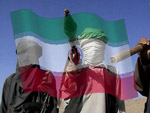 BBC: Evidence is mounting that Iran is supplying weapons to the Taliban – and that British and other foreign troops are dying in Afghanistan as a result.
BBC: Evidence is mounting that Iran is supplying weapons to the Taliban – and that British and other foreign troops are dying in Afghanistan as a result.
BBC News
By Allan Urry
Reporter, File on 4
 Evidence is mounting that Iran is supplying weapons to the Taliban – and that British and other foreign troops are dying in Afghanistan as a result.
Evidence is mounting that Iran is supplying weapons to the Taliban – and that British and other foreign troops are dying in Afghanistan as a result.
“Hypocritical, two-faced and highly dangerous.”
Strong words from British Foreign Office Minister, Alistair Burt, referring to Iran’s flouting of UN sanctions to sell arms to militant organisations like the Taliban.
Mr Burt’s fury was sparked by a consignment of powerful rockets which was discovered in February in the hands of insurgents on an Afghan battlefield.
Investigators found the rockets were fitted with fuses which could only have come from Iran.
“Iran knows exactly what it’s doing,” Mr Burt told the BBC.
“On the one hand it claims to want to come back into the international community, and the next thing they’re doing something that it knows is contrary to what the international community has decided.”
The BBC has seen a letter from the UK Mission to the United Nations, addressed to the chairman of the Security Council committee on Iran, which states without hesitation that Tehran supplied the rockets to the Taliban.
“These rockets originated in Iran and were being transferred to the Taliban at the behest of the Iranian regime,” writes Philip Parham, Charge d’Affaires to the UK Mission.
And this is only one of a number of recent incidents which provide damning evidence of Tehran’s involvement in arms smuggling to Afghanistan and elsewhere.
One such case involved former Royal Marine Andrew Faulkner, who was jailed for two-and-a-half years last year after he admitted trying to smuggle high specification rifle sights to Iran.
Not long ago the weapon of choice for Taliban fighting UK troops in Afghanistan was the improvised explosive device (IED), but in the last 15 months there has been an increase in the number of soldiers shot dead by Taliban marksmen.
Snipers
The first British victim of sniper killings was 23-year-old Corporal Richard Green, from the 3 Rifles, who was shot dead on patrol at Sangin in Helmand Province in March 2010.
His father, Chris Green, said the Taliban never used to be regarded as good shots, among British troops.
“So the main threat was IEDs and they had pretty well sorted out the IED threat,” he said.
“Snipers weren’t even considered, he never spoke to me about snipers, ever. It was always about IEDs.”
The sniper scopes Mr Faulkner tried to smuggle were stopped before they reached Tehran, but his arrest led HM Revenue and Customs to a Europe-wide illegal arms racket.
UK Customs tipped off their Italian counterparts, who began an investigation into claims that people inside – or connected to – Iran’s Revolutionary Guard were placing orders for explosive fuses and chemical parts, despite an arms embargo against the country.
The UN has become so concerned about Iranian links to illegal arms deals – both imports that violate the arms embargo, and exports that violate international sanctions on Iran – it has set up a special panel of experts to advise the Security Council.
Head of that committee is Salome Zourabichvili, who admits diplomatic efforts to halt the deals have not been 100% successful.
“It has been clear to us from what we’ve seen… that [there is a] continuous trend of Iran violating the sanctions and continuing to supply weapons to different non state organisations.”
Analysts believe Iran has been offering help and assistance to Hamas and Hezbollah and recent evidence put before the US Congress suggests links with al-Qaeda.
A leaked copy of a report for the panel for the Security Council sanctions committee says: “Iran’s circumvention of sanctions across all areas, in particular the use of front companies, concealment methods in shipping, financial transactions and the transfer of conventional arms and related material is wilful and continuing.”
The letter written by Philip Parham of the UK Mission to the UN, calls on the Security Council to investigate further, but there is no sign of urgent action.
Later this month, the (UN) sanctions committee will meet and is expected to discuss the panel of experts’ report – however, again, it is expected no action will be taken.
If Iran is hypocritical and highly dangerous, as Alistair Burt says, the signs are that for the time being at least, no-one is willing to stop it.
Despite repeated requests, neither the Iranian Embassy in London or the Iranian mission to the UN responded to the BBC’s request for comment.


